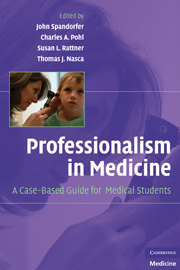Book contents
- Frontmatter
- Contents
- Contributors
- Acknowledgments
- Introduction
- PART ONE DEFINING MEDICAL PROFESSIONALISM
- PART TWO CASES INVOLVING MEDICAL STUDENTS
- PART THREE CASES INVOLVING PHYSICIANS
- 3 Principle of Primacy of Patient Welfare
- 4 Principle of Patient Autonomy
- 5 Principle of Social Justice
- 6 Commitment to Honesty with Patients
- 7 Commitment to Patient Confidentiality
- 8 Commitment to Improving Quality of Care
- 9 Commitment to Maintaining Trust by Managing Conflicts of Interest
- 10 Commitment to Professional Responsibilities
- APPENDIX: Cases by Specialty
- Index
- References
6 - Commitment to Honesty with Patients
Published online by Cambridge University Press: 25 February 2010
- Frontmatter
- Contents
- Contributors
- Acknowledgments
- Introduction
- PART ONE DEFINING MEDICAL PROFESSIONALISM
- PART TWO CASES INVOLVING MEDICAL STUDENTS
- PART THREE CASES INVOLVING PHYSICIANS
- 3 Principle of Primacy of Patient Welfare
- 4 Principle of Patient Autonomy
- 5 Principle of Social Justice
- 6 Commitment to Honesty with Patients
- 7 Commitment to Patient Confidentiality
- 8 Commitment to Improving Quality of Care
- 9 Commitment to Maintaining Trust by Managing Conflicts of Interest
- 10 Commitment to Professional Responsibilities
- APPENDIX: Cases by Specialty
- Index
- References
Summary
HONESTY WITH PATIENTS – ADULT PRIMARY CARE
Following an episode of rectal bleeding, a fifty-six-year-old man is diagnosed with metastatic colon cancer. His family physician of the past thirty years reflects on this case. Upon review of the patient's outpatient records, he realizes that fifteen years ago he noted that the patient's father had colon cancer diagnosed in his sixties, and the physician wrote several entries in the chart that the patient was to have a screening colonoscopy at age fifty. The patient has been seen five times in the past six years (for treatment of upper respiratory infections and check-ups) and the physician now realizes that he never recommended a screening colonoscopy to him.
A Perspective from a Primary Care Physician
Clinical Background
For colon cancer screening, many of the national professional organizations, including the American Cancer Society and the U.S. Preventive Services Task Force, recommend the following screening options for average risk individuals starting at fifty years of age: fecal occult blood testing annually, flexible sigmoidoscopy every five years, annual fecal occult blood test plus flexible sigmoidoscopy every five years, double contrast barium enema every five years, or colonoscopy every ten years. Each one of these tests or combination of tests has different sensitivities and specificities.
- Type
- Chapter
- Information
- Professionalism in MedicineA Case-Based Guide for Medical Students, pp. 230 - 272Publisher: Cambridge University PressPrint publication year: 2009



